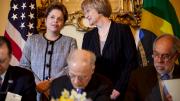Brazilian President Dilma Rousseff visited Harvard today to announce that her government will fund scholarship aid for students from Brazil, including slots for undergraduates and graduate- and professional-school students. Postdoctoral fellowships and a visiting professorship will also be funded.
"We intend to build permanent, consistent ties" between Brazil and Harvard, proclaimed Rousseff, speaking through a translator, during the formal announcement at Loeb House. "We are just now bringing to an end the efforts to eliminate extreme poverty in Brazil," she said, and therefore the country is ready to devote more resources to education "in parallel with income distribution and social inclusion."
Funding from Brazil's National Council for Scientific and Technological Development will enable up to 40 Brazilian doctoral students at a time, as well as "a small number" of undergraduates concentrating in science and engineering fields, to study at Harvard. (Candidates will be required to go through the same admissions process as all other Harvard applicants.)
"The agreement is especially important in the case of doctoral candidates, because the training grants from the U.S. National Institutes of Health and National Science Foundation, which support American science Ph.D. candidates during their first two years of study, are only available to U.S. citizens," a news release announcing the agreement noted. For the Brazilian students, their government’s aid will cover tuition and related expenses for the first two years; thereafter, Brazil will pay only the tuition, and Harvard will cover other costs, "as it does for most U.S. students."
The agreement also includes funding for 40 postdoctoral fellowships; support for up to 75 Brazilian medical students to spend a year at Harvard Medical School; and support for up to 25 graduate students to spend a year at the School of Engineering and Applied Sciences. And it includes support for a visiting professorship; Brazil's Federal Agency for Support and Evaluation of Graduate Education will nominate "a number of outstanding candidates" in various fields each year, and Harvard will consider the nominees and choose one.
Harvard president Drew Faust called the agreement another significant step in the effort "to bring Harvard to the world and the world to Harvard." The University has similar country-specific agreements that fund spots for students from Australia, China, Cyprus, Egypt, India, Mexico, South Korea, Spain, and Taiwan, according to vice provost for international affairs Jorge I. Domínguez.
"We are witnessing a moment of enormous possibility for higher education," Faust said. "Knowledge and talent know no national boundaries." She and Rousseff delivered their remarks quickly, standing in front of Brazilian and American flags; Rousseff was scheduled to speak a short while later at Harvard Kennedy School. This is her first visit to the United States since taking office last year; she met with President Obama yesterday.










